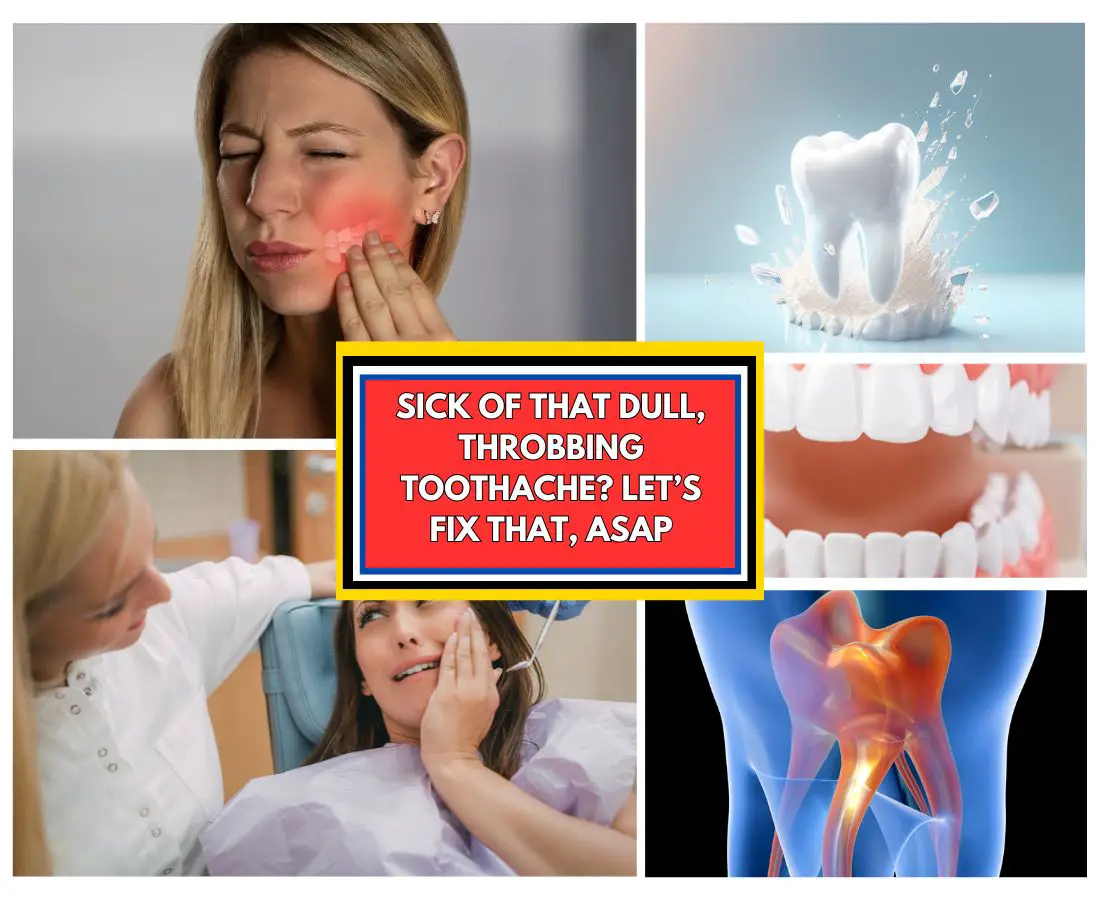
So, you’re dealing with a toothache, huh? Ugh, the worst. I know, it feels like it takes over your whole world. You can’t eat, drink, or even think straight. But don’t worry—I’ve got your back with some tips that will help ease that pain, fast.
If you’re reading this, it’s probably because you don’t want to wait for the next dentist appointment or you’re just tired of the constant throbbing. Well, good news—I’ve got a few tricks up my sleeve that you can try right now. These are simple, easy, and don’t require a prescription. You’re welcome.
What is a Toothache?
A toothache is a pain in your tooth, jaw, or gums that usually happens when something’s wrong, like a cavity or gum disease.
Sometimes it’s a little twinge, sometimes it’s a full-on drama queen. But whatever the level of pain, it’s a serious inconvenience.
If you’re looking for relief now, you’re in the right place.
1. Saltwater Rinse: Your First Line of Defense
This site contains affiliate links, please read our disclosure for more information. The content on this website was created with the help of AI.
Saltwater is basically nature’s miracle.
Just mix a teaspoon of salt with warm water, and swish it around your mouth for 30 seconds. It’s a super easy way to reduce swelling and clean out any bacteria that might be hanging out in your mouth.
It’s not going to cure your toothache completely, but it’ll definitely make things feel a little better while you figure out the next step.
2. Clove Oil: Nature’s Painkiller
Did you know clove oil has been used for centuries to help numb pain?
This little spice can work wonders!
Just grab a cotton ball, dip it into clove oil, and gently apply it to the sore area. It’ll help numb the pain and give you some relief.
It’s like giving your tooth a little vacation from the pain!
3. Over-the-Counter Pain Relievers: The Quick Fix
Okay, this one is pretty obvious, but still important.
Ibuprofen or acetaminophen can take the edge off that tooth pain while you wait to get in to see a dentist.
Be sure to follow the instructions on the package, and if the pain persists, don’t just keep popping pills. Get yourself to the dentist, girl.
4. Cold Compress: Freeze the Pain Away
A cold compress is another way to fight back against a toothache. Just grab a clean cloth, wrap some ice in it, and place it on your cheek near the painful tooth.
This will help reduce the swelling and numb the area, giving you some much-needed relief.
It’s like a mini ice pack for your mouth!
5. When to See a Dentist
Here’s the thing: natural remedies can help in the short term, but if the pain doesn’t go away after a few days, it’s time to see the dentist.
Trust me, ignoring a toothache could lead to bigger problems, and no one wants that.
It’s better to get it checked out before it gets worse. Your future self will thank you!
What is the 3-3-3 Rule for Toothaches?
The 3-3-3 rule is a helpful guideline for assessing the severity of a toothache:
- 3 days: If the pain lasts more than 3 days, it could be a sign of a more serious issue, and you should consult with a dentist.
- 3 times a day: If you experience the pain repeatedly throughout the day, it’s a good idea to seek professional advice.
- 3 hours: If the pain lasts for more than 3 hours at a time, it’s important to schedule an appointment with your dentist as soon as possible.
This rule can help you determine when a toothache might need professional attention.
What the Dentist Doesn’t Want You to Know?
Dentists have your best interest in mind, but there are some things you may not always hear:
- Preventative care is key: Dentists want to emphasize good oral hygiene to avoid costly treatments. Many issues like cavities or gum disease can be prevented with regular brushing, flossing, and routine checkups.
- Some pain doesn’t always mean major issues: Tooth sensitivity can be caused by enamel erosion or gum recession, even if there are no cavities. Sometimes minor issues can lead to discomfort that’s not always immediately obvious.
- They recommend treatments based on your health needs: If a dentist suggests a procedure, it’s usually because they believe it’s in your best interest. However, it’s always okay to ask for a second opinion if you’re uncertain.
What is the Fastest Relief for Toothache?
For fast relief from a toothache, you can try the following:
- Pain relievers: Over-the-counter medications such as ibuprofen or acetaminophen can help manage pain and inflammation temporarily.
- Cold compress: Apply a cold compress to the outside of your cheek near the painful area to reduce swelling and numb the discomfort.
- Saltwater rinse: A saltwater rinse can help clean the affected area and reduce swelling and bacteria, offering temporary relief.
These methods can help ease the pain until you can see a dentist.
Why Do My Teeth Hurt But the Dentist Says Nothing Is Wrong?
If your teeth hurt but your dentist doesn’t find anything wrong, the pain could be due to:
- Tooth sensitivity: This common issue occurs when the enamel on your teeth wears down, exposing the sensitive underlying layer (dentin). This can lead to discomfort, especially with hot, cold, or acidic foods.
- Gum disease or recession: Pain around the gums may not be related to your teeth but rather to gum issues that can be assessed by your dentist.
- Bruxism (teeth grinding): Some people grind their teeth, especially at night, which can lead to jaw pain and discomfort, even without obvious damage to the teeth.
What Helps Toothache Fast?
If you’re looking for quick relief from a toothache, try:
- Over-the-counter painkillers like ibuprofen or acetaminophen (follow the recommended dosages).
- Cold compress: Applying a cold compress to the outside of your cheek near the painful tooth can help numb the area and reduce swelling.
- Saltwater rinse: Gargling with warm salt water can help clean the area and reduce bacteria, providing temporary comfort.
- Clove oil: Clove oil has natural numbing properties and can be applied to the affected area with a cotton ball for brief pain relief.
These remedies can help manage pain while you wait to see a dentist.
What is the Best Painkiller for Tooth Pain?
The most effective painkillers for tooth pain are:
- Ibuprofen (Advil or Motrin): It’s often recommended because it reduces both pain and inflammation, providing comprehensive relief.
- Acetaminophen (Tylenol): While it doesn’t reduce inflammation, it can still be effective for relieving pain.
- Aspirin: Aspirin can be used for pain relief, but it should not be applied directly to the tooth or gums, as it could cause tissue irritation.
Always follow the dosage instructions on the label, and consult with a healthcare professional if you’re unsure about what to take.
I hope this helps you with understanding tooth pain better! If the discomfort persists, it’s always best to consult a dentist for an accurate diagnosis and appropriate treatment. Taking care of your teeth and gums is essential for overall health, so don’t hesitate to reach out to a professional if needed.
Conclusion: Don’t Let That Toothache Win! Toothaches are no fun, but luckily there are simple solutions to help relieve the pain temporarily.
From saltwater rinses to clove oil, these tips will help you feel better until you can get professional help. Don’t let that toothache take over—take charge and start feeling better today.
And remember, always consult a dentist if the pain doesn’t go away. You’ve got this, and I’m rooting for you!







